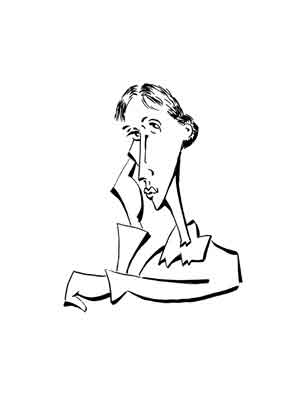Virginia Woolf

Virginia's life arguably spanned the most extreme transitions in history. She was born just before the last quartile of the Victorian Era, which means she grew up when people went about their jobs on foot or if they were well-to-do could take a horse and carriage.
This was also the time when entertainment meant live entertainment. For music you had to go to a concert or music hall, and drama and comedy meant watching actors perform on stage. So yes, there was passive entertainment in the good old days, and with the upper crust gargantuan meals, men would tub up in their thirties and keel over by 45. For women it was even earlier.
But living as a citizen of the Greatest Nation on Earth had it's advantages. Sea side vacations - "holidays" to the subjects of Good Queen Drina - were accessible to all by the now cheap and frequent rail coaches, and if you were wealthy enough, you could take a trip across the seas on luxury steam liners. Why you could travel from London to New York in just 6 short days!
Virginia turned adult as the Edwardian Era had just got underway, and there were signs of the future looming on the horizon. More houses and buildings were being lit by electricity, and every now and then you might see one of these novelties - the automobile - coughing and chugging along the roads. When Virginia turned 21 there was even this story of two bicycle makers who made a flying machine that flew for thirty seconds!
By the time she died, commercial airplanes were flying the Atlantic. Radio was in almost every home, and there was even television if not yet a lot of sets. The BBC had been broadcasting children's telly and crime dramas, and in the US, sports - including football, baseball, hockey, and basketball - were on the tube. Game shows, if not yet being broadcast, were literally just around the corner.
But Virginia's livelihood was based on traditional technology, those non-electronic devices with white flappy things in the middle. But she, too, was a innovator and was recognized as one of the "modernist" writers who began springing up in the early 20th century and caused so much angst amongst traditional critics. But what was innovative and new eventually becomes old hat and even corny. Today you pick up books that shocked! shocked! people a hundred years ago and wonder what the fuss was all about.
So even if you're not one of Virginia's fervent fans - who point out that she wrote about topics that are still relevant today - you can learn a bit about Mrs. Woolf - yes, Virginia was in some ways quite traditional and wrote under her married name - if you just click here.